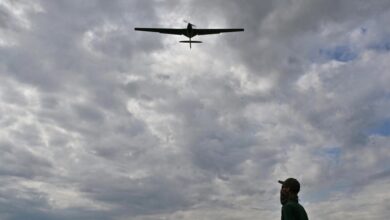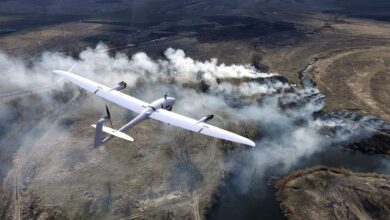Pompeo blames Iran for ‘act of war’ in Saudi oil attack, US seeking coalition
U.S. Secretary of State Mike Pompeo on Wednesday, September 18 described strikes on key Saudi oil installations as an “act of war” against the kingdom and said the United States was seeking to build an international coalition against Iran.
“This is an attack of a scale we’ve just not seen before,” Pompeo told reporters on a plane before landing in Jeddah where he was due to meet Saudi officials. “The Saudis were the nation that were attacked. It was on their soil. It was an act of war against them directly.”
He added there was no evidence the attacks had been launched from Iraq, amid media speculation the drones had been fired from there.
“We also know that these are systems that the Iranians have not deployed anyplace else, that they have not deployed outside of the country, to the best of our knowledge,” Reuters reported him as saying. “We’ve seen no evidence that it’s come from Iraq. It could well have traveled over Kuwait, we’ve not seen that either.”
The secretary said his “mission” in Saudi Arabia was to “work with our partners in the region” to deter Iran.
“We will be working with our European partners as well. I’ve spoken to I think all of them at least once or twice,” he said, adding, “We are working to build out a coalition to develop a plan to deter them. And this is what needs to happen.”
The Iran-backed Houthi rebels in Yemen, where a Saudi-led coalition is bogged down in a five-year war, claimed Saturday’s strikes against two plants owned by state energy giant Aramco.
Houthi rebels said they launched “a large-scale operation involving 10 drones that targeted refineries in Abqaiq and Khurais in eastern Saudi Arabia,” according to the group’s Al-Masirah television.
But Saudi defense ministry spokesperson Turki al-Maliki on Wednesday said that the kingdom would soon release evidence showing the attacks were “unquestionably” sponsored by Iran, adding that evidence showed they came from the north and could not have been launched from Yemen.
Speaking at a press conference, al-Maliki displayed what he said were fragments of the arsenal of 18 drones and seven cruise missiles.
“Despite Iran’s efforts to make it appear so” they did not originate from Yemen, Maliki said, adding the strike was beyond the capabilities of the rebels.
“The precision impact of the cruise missile indicated advance capability beyond [Iranian] proxy capacity,” he said, adding that they also struck from a direction that ruled out its southern neighbor Yemen as a source.
The U.S., France and United Nations have sent experts to investigate the attacks, which knocked out half of Saudi Arabia’s oil production.
Saudi Arabia has spent billions on military hardware but recent events have underscored the vulnerability of its infrastructure.
The Houthis have staged repeated cross-border missile and drone attacks targeting Saudi air bases and other facilities in what they say is retaliation for the Saudi-led bombing campaign on rebel-held areas in Yemen.
President Donald Trump, who has already re-imposed sanctions that have crippled Iran’s economy, vowed to “substantially increase” the measures, winning quick praise from Saudi Arabia.
He said details of the new sanctions would be released within 48 hours.
Asked by reporters about a possible U.S. attack on Iran, Trump said “there are many options. There’s the ultimate option and there are options a lot less than that.”
“There’s plenty of time to do some dastardly things,” he said. “If we have to do something we’ll do it without hesitation.”
The Houthis, meanwhile, said they had they had the means to hit “dozens of targets” in the United Arab Emirates, which is part of the coalition fighting them in Yemen.
With reporting from AFP












